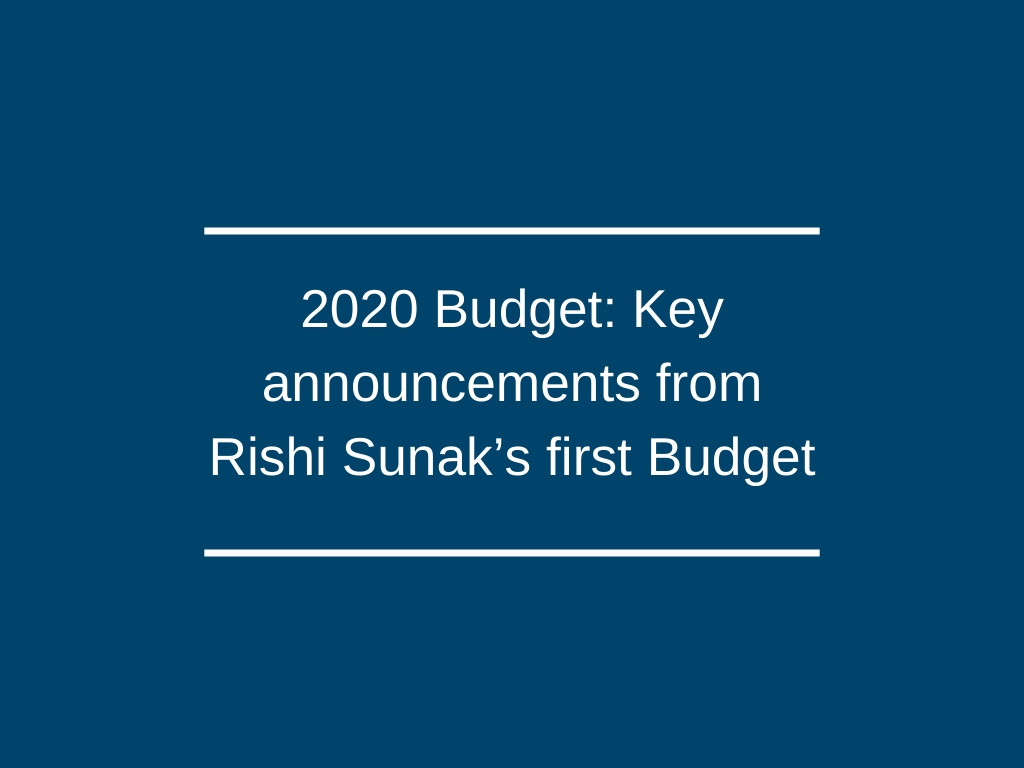
Rishi Sunak delivered his first 2020 Budget on Wednesday 11th March. This came only weeks after he took over the role of Chancellor from Sajid Javid.
Raring and ready to ‘get things done’, Mr. Sunak promised a speech that would deliver ‘security for today’, that would ‘deliver on change’ and that would ‘lay foundations for prosperity tomorrow’.
In this post-Budget blog we summarise some of the key announcements affecting you, your family and your business…
Temporary measures in response to Coronavirus
To start proceedings, and possibly not in the way that he would have imagined a few weeks ago, Mr. Sunak announced a number of ‘temporary, timely and targeted’ measures to help the UK cope with Coronavirus.
This came only hours after the Bank of England dropped interest rates to 0.25%. The measures include:
- Day 1 eligibility for Statutory Sick Pay (SSP), for individuals required to take leave from work because of the virus.
- Recognising the cost to businesses, the government will refund the cost of providing SSP to employees, for up to 14 days, to those with fewer than 250 employees.
- A temporary ‘Business Interruption Loan Scheme’; this gives banks the ability to offer small and medium-sized businesses loans of up to £1.2m.
- Abolishing business rates for retailers with a rateable value below £51,000 in 2020/21 and a temporary extension of this policy to include leisure and hospitality businesses (previously excluded).
National Living Wage (NLW) & National Insurance Contributions (NICs)
The government reaffirmed its commitment to ensuring that the NLW is two thirds of median earnings, which requires a rate of £10.50/hr, and that it is extended to those aged 21 or over, by 2024. This is in addition to the planned NLW increase in April 2020, which will see it rise by to £8.72/hr.
The primary Class 1 NI threshold for employees and the self-employed will increase to £9,500, from £8,632. For most employees, this will represent a saving of £104 saving and for most self-employed workers, a saving of £78.
For employers though, the news is not so good since the secondary threshold will only increase from £8,632 to £8,788. We discuss the implications of this more in more detail here.
‘An attractive place to do business’
Changes to Entrepreneurs’ Relief were expected, and the Chancellor did not disappoint. He did not abolish the relief but reduced the lifetime limit on gains from £10m to £1m. This measure took effect on Budget day. Unfortunately, he also announced anti-forestalling legislation. Anti-forestalling legislation wipes out most of the tax planning carried out before the Budget – a clear example of retrospective taxation.
In a bid to ensure the UK is still an attractive place to do business, he went on to announce that the Structure and Buildings Allowance (SBA) would increase to 3%. Additionally, Research and Development Enterprise Credit (RDEC) will increase from 12%, to 13%, only befitting large companies, and Corporation Tax will remain at 19%.
The National Insurance Contribution Employment Allowance will increase to £4,000. However, from 6 April 2020, only employers paying National Insurance of less than £100,000 benefit.
Other key Budget 2020 announcements
- The Personal Allowance will remain at £12,500 for 2020/21.
- Fuel duty remains frozen.
- All alcohol duties frozen for 2020/1.
- No VAT charged on digital publications, from 1 December 2020.
- Removal of the entitlement to use red diesel, with the exception of agricultural businesses, and those in the business of fishing, rail or domestic heating.
- Non-UK residents to pay a 2% Stamp Duty Land Tax (SDLT) surcharge on UK residential property, from April 2021.
- A plastic packaging tax will be introduced from April 2022.
- £2.8bn provided for Direct Payments to farmers in 2020. Read more about this here
To read about the announcements in more detail and about those we have not covered, in our 2020 Budget Summary, click here.
At George Hay we provide professional and proactive tax advice, and advisory services, to businesses of all sizes and individuals. If you’re concerned about any of the announcements in yesterday’s Budget, or if you have questions about how they might affect you or your business, please do contact us.
Information correct at time of writing (11/03/2020). Please keep an eye on our blog, as we will endeavour to cover the latest news affecting you and your business at this time. If you have any questions relating to the 2020 Budget, or the measures in place to support businesses during the COVID-19 outbreak, do contact your usual adviser.